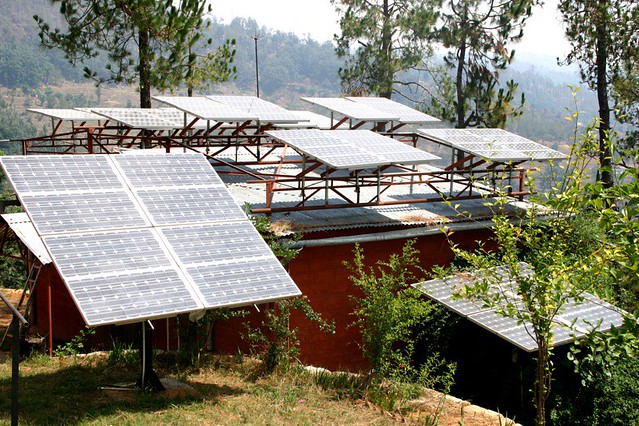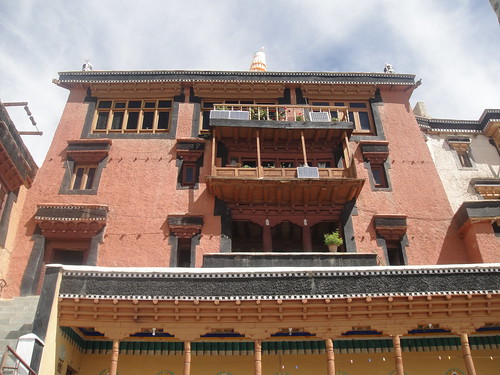Today, June 5th is World Environment Day and this year's theme is Green Economy: Does it include you? According to the UN Environment Programme (UNEP), green economy is described as:
one that results in improved human well-being and social equity, while significantly reducing environmental risks and ecological scarcities. In other words, we can think of a green economy as an economic environment that achieves low carbon emissions, resource efficiency and at the same time is socially inclusive.
Renewable Energy is one of the key sectors of a green economy. In India, growing concerns about energy security
have led the government to commit to the development of renewable
energy, with special focus on harnessing the abundantly available solar
energy. In 2008, during the launch of India's National Action Plan on
Climate Change, the Indian Prime Minister Dr. Manmohan Singh had stated:
Our vision is to make India’s economic development energy-efficient. Over a period of time, we must pioneer a graduated shift from economic activity based on fossil fuels to one based on non-fossil fuels and from reliance on non-renewable and depleting sources of energy to renewable sources of energy. In this strategy, the sun occupies centre-stage, as it should, being literally the original source of all energy. We will pool our scientific, technical and managerial talents, with sufficient financial resources, to develop solar energy as a source of abundant energy to power our economy and to transform the lives of our people.
In line with this aim, the Jawaharlal Nehru National Solar Mission, which was launched on the 11th
January, 2010 by the Prime Minister, has set an ambitious target of
deploying 20,000 MW of grid connected solar power by 2022. Given that high cost is
a key challenge in implementing solar projects, the solar mission aims
to "reduce cost of solar power generation in the country through (i)
long term policy; (ii) large scale deployment goals; (iii) aggressive
R&D; and (iv) domestic production of critical raw materials,
components and products, as a result to achieve grid tariff parity by
2022".
On 24th May 2012, the Union Minister of New & Renewable Energy Dr. Farooq Abdullah, while addressing the first meeting of the Solar Energy Industry Advisory Council (SEIAC) in New Delhi, called upon
the industry leaders to invest in Solar Energy Projects in the country.
He assured them of the full support of the Government in setting up
solar projects based on both grid connected as well as off grid
applications. At the same time, he asked industry leaders to respond
favourably and positively to the incentives offered by the Government in
this direction. The Minister said that India has a vast scope for
developing solar energy applications as still many parts of rural India
do not have access to grid connected electricity. He cited the example
of high altitude places in Ladakh where solar energy has changed
people’s lives.
Mr. Narendra Modi, the Chief Minister of the Indian state of Gujarat, blogged on the occasion of the World Environment Day. He wrote:Despite being a power surplus state, Gujarat made great advances in solar energy. Our state was the earliest to come up with a solar policy. Just a few months ago, Gujarat dedicated to the nation 600 MW solar power to the nation along with Asia’s largest solar park at Charanka. Today, Gujarat produces 2/3rd of the solar power in India.
One grassroot initiative that has been focusing on popularizing solar electrification in remote, rural areas since 1984, is the Barefoot College of Tilonia, the brainchild of Sanjit 'Bunker' Roy. In this TED video,
Mr. Roy talks bout the Barefoot methodology. The Barefoot College
essentially "trains a few members of the community to be ‘Barefoot Solar
Engineers’ (BSEs)". These BSEs in turn install, repair and maintain
solar lighting units within the community as well as train other
community members. The video below tells the story of the first women Barefoot Solar Engineers of Hyderabad in Andhra Pradesh, India.
Today,
the Barefoot Solar Engineers are growing in numbers and can be found
not only in India but in many countries around the world as can be seen
on this map - truly a global movement.
On
this World Environment Day, India is renewing its solar energy pledge -
to bring down costs, scale up solar infrastructure, train more solar
evangelists and perhaps spark a solar revolution.
This post was first published in Global Voices Online



